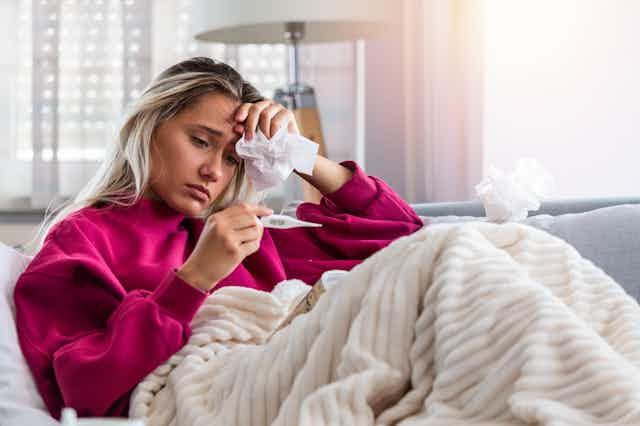The COVID pandemic has been going on for well over two years now. During this time, SARS-CoV-2 (the virus that causes COVID-19) has slowly mutated, allowing it to evade the immune system enough to infect people many times.
As so many of us have had COVID already, it’s no surprise that plenty of people are catching the virus for a second or even a third time. In the UK, this has been particularly noticeable since the emergence of the omicron variant from December 2021 onwards.
But when reinfected, are you likely to feel better or worse than you did the first time you had COVID? As well as being a question many people are curious about, this is an important issue from a public health perspective.
If symptoms are more severe, each time someone gets infected, we would expect the pandemic to escalate as people become sicker and sicker. A zero-COVID strategy would be the only way to avert waves of serious illness.
The alternative is almost precisely the opposite. If each subsequent infection is less severe, the pandemic would eventually fizzle out on its own without the need for masking, quarantine, lockdowns or other measures.
So what does the evidence say?
A recent preprint (an article published online before undergoing peer review) was interpreted as suggesting that symptoms of reinfections with COVID are worse than those of initial infections.
But the authors didn’t specifically look at symptom severity. They looked at the likelihood of death from any cause, hospitalisation, and a variety of health problems within six months after infection. The researchers concluded that these measures were worse after reinfections.
While this isn’t good news, the results need to be interpreted carefully. The data used in this study comes from electronic healthcare records of over 5 million US army veterans, over 290,000 of whom had COVID at least once.
For a start, the group studied was already at higher risk of experiencing worse outcomes compared with the overall population. The average age was 60, around 20% smoked and more than 80% of those who contracted COVID were not vaccinated. So the results may not apply to the general population.
Second, the reinfection group were analysed immediately after reinfection, while the initial infection group were not analysed until 30 days following infection. This means that the outcomes observed for reinfection include all the early COVID symptoms (headache, cough, fatigue and so on) which the other group may have recovered from. As the data included any symptoms or health problems that occurred within the study period, including acute infection in one group skews the findings, making reinfections appear worse.
Read more: COVID reinfections: are they milder and do they strengthen immunity?
So what does this preprint show? It suggests that reinfections increase your general risk of health problems. But it’s worth remembering that the study population was at higher risk already.
Respiratory infections such as influenza are a leading cause of death globally, so it’s not entirely surprising that any extra respiratory infections will increase a person’s risk of health problems.
This finding, however, is not the same as symptoms of reinfections being more severe.
Immune memory
This study caused somewhat of a stir on Twitter because we would expect the opposite – that each subsequent infection would tend to cause less severe symptoms than an initial infection, or at least very little change.
Immune memory is the phenomenon where the immune system “remembers” past infections and responds more quickly and effectively to reinfections, lessening the spread of the virus and general symptoms. This is because the immune system makes antibodies, and a type of white blood cell called a T cell during the initial infection. The immune system then reuses the same antibodies and T cells to fight the reinfection.
Many modern vaccines (including COVID vaccines) are based on this concept – they “train” the immune system to remember the virus next time.

For many diseases, such as smallpox, measles and chickenpox, surviving the illness once gives you immunity that makes any reinfection much less severe. One exception is dengue fever where the immune system can make antibodies that actually aid reinfection, making symptoms worse in some cases.
With COVID, studies on reinfections tend to look at deaths and hospitalisations, as these are easier to measure than symptoms. In general, they find that reinfections are less severe than initial infections.
It’s not the same for everyone
You might be thinking, “my second infection hit me harder than the first”. It is plausible that some people might experience worse symptoms from reinfection compared with initial infection. This could be due to several factors. Different strains might cause more severe symptoms, such as delta, which is likely more severe than beta.
A higher initial dose of virus (say, if someone with COVID sneezes on you) might allow more virus spread before the immune system can control the infection.
Finally, the waning of immune responses over time might lead to worse symptoms. For example, if your first infection occurs very soon after vaccination, but you’re then reinfected months later when your antibody levels are lower, it would make sense that your first infection was milder.
These things will happen in individual people but are unlikely to play a major role across large populations. What would concern me is if we started to see trends of hospital admissions among people who had mild symptoms during a first infection but were getting very sick with reinfections. So far, I have seen no evidence of this.

